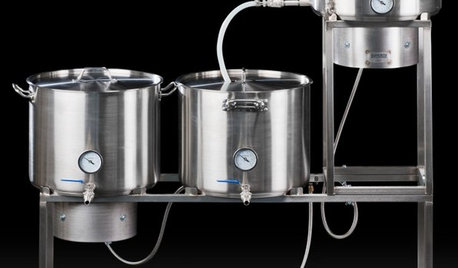Spent Malted Grain From Brew Pubs?
gonebananas_gw
16 years ago
Related Stories

TRAVEL BY DESIGN10 Ideas for Packable Decor From Your Travels
It's fun to decorate with finds from a trip — but not so fun to lug them home. These ideas are affordable and easy on the suitcase
Full Story
KITCHEN DESIGN20 Kitchen Must-Haves From Houzz Readers
We asked you to tell us your top kitchen amenities. See what popular kitchen features made the list
Full Story
MOST POPULAR11 Nominees for the ‘She Shed’ Hall of Fame
These special sanctuaries let busy women get away from it all without leaving the backyard
Full Story
HOME TECHMake Home Sweet Home Even Sweeter With a Brewery Or Winery
New high-tech products make small-scale home beer and wine production easy and fun
Full Story
LIFEHow Do You Make Your Tea and Coffee in the Morning?
A morning cup is a must for many, and preparation comes in many guises. We look at coffee and tea habits across the Houzz community
Full Story
HOUZZ TOURSMy Houzz: A Rock 'n' Roll Dad's Pad Gets a Tune-up
Small additions and renovations bring casual style to a spacious midcentury ranch home
Full Story
SALVAGEReinvent It: 9 Ways to Resurrect Church Pews
Unusual proportions make these long benches problem solvers as well as unique points of interest all around the home
Full Story
WORKING WITH PROSHow to Commission Custom Wood Furnishings
Can't find just the right table, shelf, desk or what have you? It's woodworkers to the rescue
Full Story
GREEN BUILDINGInsulation Basics: Heat, R-Value and the Building Envelope
Learn how heat moves through a home and the materials that can stop it, to make sure your insulation is as effective as you think
Full Story
LIFE8 Home Projects Perfect for Holiday Downtime
Start the new year on the right foot by using some free time now to organize, store and clean
Full Story






lorna-organic
Kimmsr
Related Professionals
Aloha Landscape Contractors · Brandon Landscape Contractors · Coeur d'Alene Landscape Contractors · El Reno Landscape Contractors · Hannibal Landscape Contractors · Royal Oak Landscape Contractors · Sammamish Landscape Contractors · Sun City Center Landscape Contractors · Tewksbury Landscape Contractors · Woodbury Landscape Contractors · Hot Springs Village Decks, Patios & Outdoor Enclosures · New Lenox Decks, Patios & Outdoor Enclosures · Tomball Decks, Patios & Outdoor Enclosures · Jericho Stone, Pavers & Concrete · Rolling Meadows Stone, Pavers & Concretelorna-organic
rootdoctor
fancifowl
gonebananas_gwOriginal Author
hamiltongardener
Karchita
urbanfarmertim
fertilizersalesman
Kimmsr
lorna-organic
paulns
urbanfarmertim
fertilizersalesman
paulns
urbanfarmertim
space_turtle
eagle_jay
coffeehaus
rootdoctor
bm5447_yahoo_com
rootdoctor
rootdoctor
urbanfarmertim
takadi
darth_weeder
toddles_2009
lazy_gardens
rootdoctor
caroline1
golliegee83_gmail_com
mbm630_yahoo_com
chudak
Stormygale
trickyrick
albert_135 39.17°N 119.76°W 4695ft.
lazy_gardens